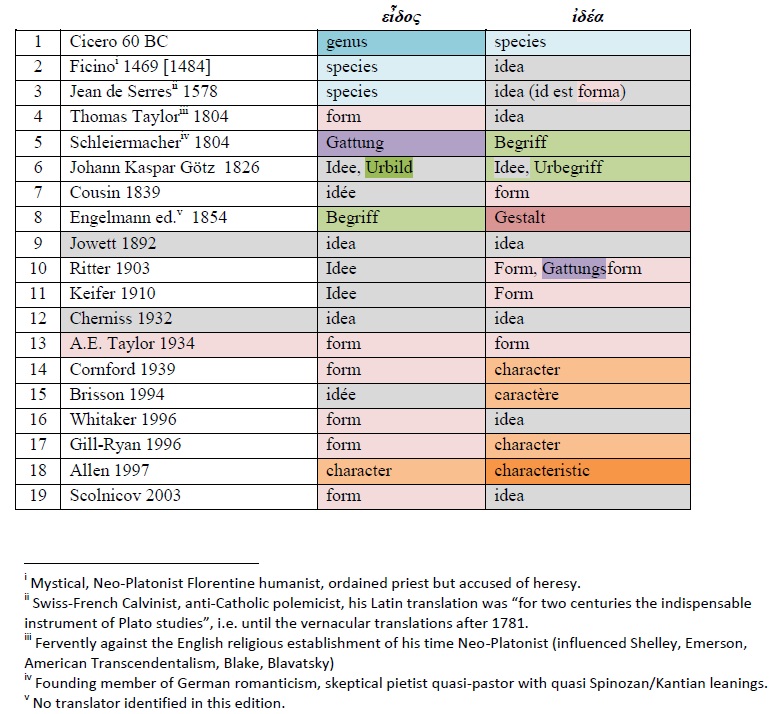Plato’s work was unknown to Western Europe for most of its history. The full body of Plato’s writings first became available to Latin language readers in 1484 A.D. – 1,831 years after Plato’s death. From the time of Cicero until the 12th century only half of the Timaeus was available in Latin, then around 1160 A.D. the Phaedo and the Meno were translated.
Plato started becoming available in modern languages in 1804 A.D. – 2,151 years after his death, almost a quarter century after Kant’s Critique of Pure Reason, and almost two centuries after Descartes’s Discourse on Method. Other than mystical Neo-Platonic interpretive claims and a bit of somewhat benign gossip from Aristotle, absolutely nothing of Plato’s own thought was known in the West until almost two millennia after his death.
Two millennia later! Let this sink in, then consider if you want to lend credence to Alfred Whitehead’s celebrated quip that “the European philosophical tradition … consists of a series of footnotes to Plato”.
On top of two millennia of sedimentation we have the problem of Plato translations, primarily centered on two words, eidos (εἶδος) and idea (ἰδέα) – a problem discussed in some detail in my previous posting.
The long list of words used to translate εἶδος and ἰδέα into western European languages has included: Genus, species, idea, form, Gattung, Begriff, Urbild, Urbegriff, Gestalt, Gattungsform, character, characteristic, concept, conception, kind, shape, figure, look, etc.
These are often used interchangeably and a bit less often indiscriminately. Eidos and idea are explained by Plato in the Parmenides. As long as his Parmenides explanation is viewed as “enigmatic” by the scholarly community, Plato’s entire work remains “enigmatic” and Plato himself an enigma to us to this day. Hence, the problem of translation persists as it has for 24 centuries.
We shall continue to have colossal and growing Plato-related and Plato-inspired bibliography but very little of it will be “footnotes to Plato”. It will be footnotes to what we think about Plato.
The Plato problem in the Western tradition is three-fold:
First: The Greek-speaking sector of this tradition eventually succumbed to a cultural collapse that had already begun in Plato’s lifetime (and that Plato unsuccessfully attempted to counter with his teaching program). That collapse was accompanied by a process of general distortion of the Greek language, a phenomenon aptly described by Thucydides[1]. This collapse was then followed by the demoralization reflected in the rise of Skeptical, Cynical, Epicurean and other similar a-social and anti-social philosophical movements, then a failed, dutiful attempt by Stoicism to revive the civic virtues essential for public life and, finally, the withdrawal to the mystical world of Neo-Platonism – essentially an escapist oriental philosophy that sought legitimacy by claiming to interpret Plato’s legendary “unwritten doctrine”. The Greek-speaking East lost Plato’s rigorous noetic engagement with the world of real being and chose to abide in the imaginative Neo-Platonic twilight zone of beyond-being (hyper-ousia, ὑπερουσία).
Second: The Latin-speaking sector was simply ignorant of Plato. The great philosophers of the Scholastic tradition had virtually no access Plato’s own written legacy – certainly no access at all to the most crucial dialogues, Parmenides, Theaetetus, Sophist, Statesman, Philebus, Hippias Major and Republic. The greats of Scholastic philosophy – Saint Anselm, William of Auvergne, Albertus Magnus, Saint Thomas Aquinas, Saint Bonaventure, William of Ockham, Duns Scotus, Roger Bacon, et al. – did not know Plato. They knew what Proclus and the pseudo-Areopagite thought they knew about Plato. But nothing of the great Scholastic philosophers’ work can be construed as a “footnote to Plato”; a footnote to Aristotle, perhaps.
Third: The philosophical movements of the post-Scholastic (and anti-Scholastic) Enlightenment were, for the most part, carried out in the medium of vernacular Western languages. Its leaders from Descartes, Locke and Hume to Kant, to the extent that they consulted Plato, did so through inadequate Latin translations of Plato rather than the original Greek. Moreover, it was the conversion of the vernacular languages into effective instruments of intellectual ferment that secured the triumph of the Enlightenment among larger secular populations. But those broader population layers, which within a couple of generations would form the ranks of the new, non-clerical intellectual class, knew little or no Greek and Latin. They would be unable to access Plato’s thought until the 19th century vernacular translations were made available.
Essentially, most of the intellectual elite that carried out the scientific revolution of the 18th to the 20th century – say from Lavoisier and Faraday to Maxwell and to Einstein, Bohr, Schrödinger and Heisenberg – had access to Plato only through the mist of flawed vernacular translations, i.e. had access only to the “enigmatic” Plato.
The incoherence of Plato translations into Western European vernaculars is evident in the general disagreement about how to translate εἶδος and ἰδέα: each translator chooses a word that best suits his ideological agenda. Here is a sample: 
__________________
Thucydides footnote:
[1] “The revolution hurled many and terrible things upon the cities, of the kind that occur and will always occur as long as human nature is what it is … They changed the customary meaning of words in order to justify their deeds. Reckless daring was mistaken for loyal courage, provident caution for cowardice cloaked in respectability, prudence for unmanly excuse making, wise approach to all things as hesitating about all things; frantic shrillness was added to manliness, secretive scheming became reasonable excuse for desertion. Thucydides, Histories, III.82.2-4